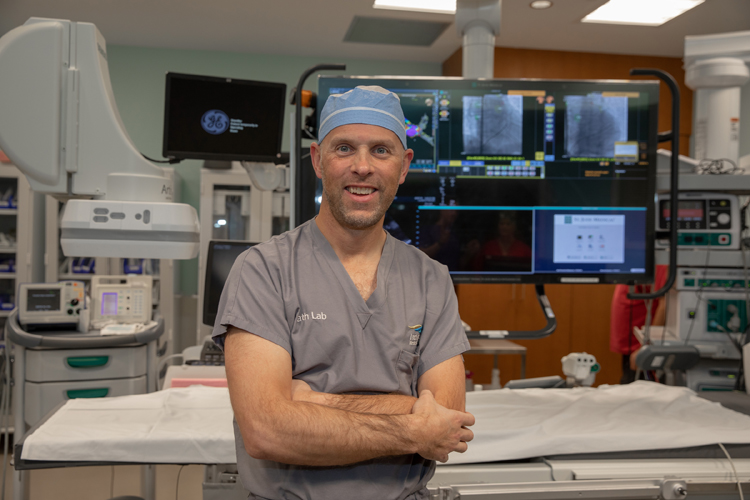
The heart is a complex organ, and if for some reason it starts beating erratically it is important to seek the advice of an electrophysiologist to assess your heart’s electrical system and determine the root of the arrhythmia.
Dr. Brett Faulknier, director of electrophysiology at Cleveland Clinic Indian River Hospital in Vero Beach, is a master heart electrician with a toolbox full of advanced technology designed to measure rhythm disturbance so appropriate treatment can be determined.
Dr. Faulknier joined Indian River Medical Center, now known as Cleveland Clinic Indian River Hospital, in 2016, the same year the hospital opened its state-of-the-art electrophysiology lab and two surgical suites, establishing its Welsh Heart Center as one of the most comprehensive programs in the country. Since then, more than 2,000 procedures have been performed by Dr. Faulknier and fellow electrophysiologist Dr. Fahad Ali.
In layman’s terms, an electrophysiologist is a cardiologist who practices electrical cardiology and helps people who are experiencing abnormal heartbeats or arrhythmia.
The goal is to physically fix the heart through a procedure called ablation. The doctor puts a thin, flexible catheter into a blood vessel in your leg and guides it to the heart, where he looks for irregular electrical signals. When the probe reaches the area that’s causing the arrhythmia, the physician carefully destroys malfunctioning tissue using the catheter to deliver energy (such as radiofrequency, laser or cryotherapy) to scar the problematic area and get rid of the abnormal circuit or electrical pathway.
“The most common arrhythmia we treat is atrial fibrillation, or more commonly referred to as AFib,” said Dr. Faulknier. “This condition increases as people age and it can be treated with medication or ablation therapy.
“It’s a bit like arthritis for the heart that causes the heartbeat to get stiffer, a process called fibrosis. As the upper chambers of the heart experience stiffness, so does the heart wiring and it simply doesn’t work as well as it once did, causing abnormal rhythm. Some patients feel it, others don’t. It varies between individuals, but many notice a shortness of breath and fatigue.”
AFib is the most common cause of strokes in the United States, although sometimes when a stroke patient arrives at the hospital the heart is beating normally. In order to pin down the source of the problem, a heart rhythm monitoring recorder is implanted under skin to monitor the heart rhythm 24/7. In some cases, pacemakers and defibrillators are used to control irregular heartbeats by sending electrical pulses to the heart.
With all the advances in technology, individuals can actually self-monitor their own heartbeat rhythm. According to Dr. Faulknier, the Apple watch has an electrocardiogram app that can record your heartbeat using an electrical heart sensor and check that recording for AFib. Other devices such as the KariaMobile capture medical-grade EKGs and store the data on your phone. You can even email the EKG to your doctor with the press of a button.
“All of these technological advances with smartphones are becoming very popular for the person who may not qualify for a plant recorder but wants to do aggressive monitoring,” Dr. Faulknier said. “While they may not be medical grade, they can catch a problem early.”
Exercise is important to heart health and Dr. Faulknier is a doctor who practices what he preaches. Lately he’s been doing ULTRA 100-mile marathon running. “I’ve completed three 100-mile races,” he said. “I placed first in my age group in the Florida Keys race from Key Largo to Key West. It was on flat terrain and only took me 18 1/2 hours to finish. It took me nearly double that time – 35 hours – to complete the 100-mile course in the mountains of Wyoming. Probably the most scenic run was the 100-mile run across the southern half of Great Britain.”
Dr. Faulknier started out his exercise program with small steps. He got serious about exercising in 2009 and started running 5Ks, then 10Ks, then half marathons and marathons. Eventually, he moved on to triathlons, ironman competitions and ultra-running.
“If you’ve had a history of chronic disease or question your overall well-being, then check with your doctor to make sure you are qualified before starting an exercise regime,” Dr. Faulknier advised. “That being said, most people with no pre-existing conditions can start exercising on their own. New Year’s resolutions are great, but you need to do something to keep you motivated. Finding like-minded people has worked for me because it keeps me accountable.
“The key is consistency,” Dr. Faulknier continued. “You have to just show up and keep showing up. It doesn’t take a lot of time, but you need to schedule a time and stick to it. I exercise between 4:30 a.m. and 6 a.m. so I can be at my practice the rest of the day. It actually does more for me mentally than it does physically as it helps me keep balanced and clears my mind for my stressful job.”
Being mindful of your heart and body is one of the most important things you can do to increase your quality of life. Pay attention to subtle signs and if you find yourself feeling chronically fatigued or short of breath, seek medical attention before it’s too late.
Dr. Faulknier is board certified in Adult Cardiovascular Disease and Cardiac Electrophysiology. Prior to joining IRMC, he served seven years as Section Director of Electrophysiology and Associate Professor of Medicine at West Virginia University Charleston. Faulknier received his Doctor of Osteopathic Medicine from West Virginia School of Osteopathic Medicine and earned fellowships in Adult Cardiovascular Disease and Cardiovascular Electrophysiology.
Dr. Faulknier is located at the Health and Wellness Center. For more information or to schedule an appointment, call 772-226-4830.



